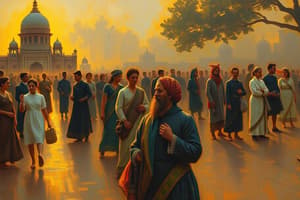Podcast
Questions and Answers
What was modern nationalism in Europe associated with?
What was modern nationalism in Europe associated with?
The formation of nation-states.
How is the growth of modern nationalism connected to the anti-colonial movement in India?
How is the growth of modern nationalism connected to the anti-colonial movement in India?
It is intimately connected as people discovered their unity through their struggle with colonialism.
The Congress under Mahatma Gandhi successfully forged unity among all groups without any conflict.
The Congress under Mahatma Gandhi successfully forged unity among all groups without any conflict.
False (B)
What economic consequences followed the First World War affecting India?
What economic consequences followed the First World War affecting India?
What was the result of forced recruitment in rural areas during the war?
What was the result of forced recruitment in rural areas during the war?
What epidemic accompanied the food shortages in India after the war?
What epidemic accompanied the food shortages in India after the war?
When did Mahatma Gandhi return to India?
When did Mahatma Gandhi return to India?
Flashcards are hidden until you start studying
Study Notes
Emergence of Modern Nationalism in India
- Modern nationalism in Europe led to the formation of nation-states, changing perceptions of identity and belonging.
- In India, nationalism developed alongside the anti-colonial movement, linking diverse groups through shared experiences of oppression under colonial rule.
- The Indian National Congress, under Mahatma Gandhi, aimed to unify various groups against colonialism, though this process involved conflicts and differing notions of freedom.
Nationalist Movements in India (Post-1920)
- The 1920s saw the expansion of the national movement, reaching new social groups through innovative modes of protest.
- Economic conditions post-World War I significantly impacted India, including increased defense spending and the introduction of new taxes, leading to widespread hardship.
- Prices in India doubled from 1913 to 1918, causing severe struggles for the population; rural areas faced forced recruitment for soldiers, inciting anger among villagers.
- Crop failures in 1918-19 and 1920-21 led to acute food shortages, exacerbated by an influenza epidemic resulting in 12 to 13 million deaths from famine and disease by the 1921 census.
Role of Mahatma Gandhi and Satyagraha
- Mahatma Gandhi returned to India in January 1915 after successfully implementing nonviolent resistance in South Africa.
- His leadership brought new strategies to the Indian independence movement, focusing on Satyagraha as a form of nonviolent resistance against colonial oppression.
Studying That Suits You
Use AI to generate personalized quizzes and flashcards to suit your learning preferences.




